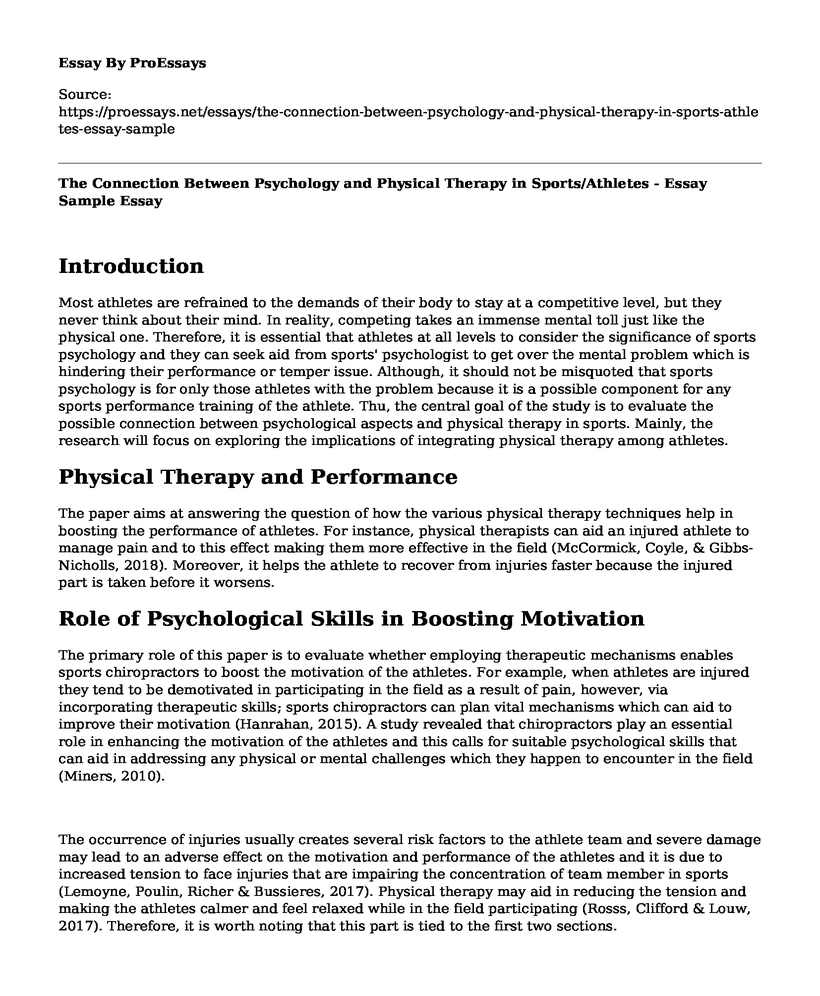Introduction
Most athletes are refrained to the demands of their body to stay at a competitive level, but they never think about their mind. In reality, competing takes an immense mental toll just like the physical one. Therefore, it is essential that athletes at all levels to consider the significance of sports psychology and they can seek aid from sports' psychologist to get over the mental problem which is hindering their performance or temper issue. Although, it should not be misquoted that sports psychology is for only those athletes with the problem because it is a possible component for any sports performance training of the athlete. Thu, the central goal of the study is to evaluate the possible connection between psychological aspects and physical therapy in sports. Mainly, the research will focus on exploring the implications of integrating physical therapy among athletes.
Physical Therapy and Performance
The paper aims at answering the question of how the various physical therapy techniques help in boosting the performance of athletes. For instance, physical therapists can aid an injured athlete to manage pain and to this effect making them more effective in the field (McCormick, Coyle, & Gibbs-Nicholls, 2018). Moreover, it helps the athlete to recover from injuries faster because the injured part is taken before it worsens.
Role of Psychological Skills in Boosting Motivation
The primary role of this paper is to evaluate whether employing therapeutic mechanisms enables sports chiropractors to boost the motivation of the athletes. For example, when athletes are injured they tend to be demotivated in participating in the field as a result of pain, however, via incorporating therapeutic skills; sports chiropractors can plan vital mechanisms which can aid to improve their motivation (Hanrahan, 2015). A study revealed that chiropractors play an essential role in enhancing the motivation of the athletes and this calls for suitable psychological skills that can aid in addressing any physical or mental challenges which they happen to encounter in the field (Miners, 2010).
The occurrence of injuries usually creates several risk factors to the athlete team and severe damage may lead to an adverse effect on the motivation and performance of the athletes and it is due to increased tension to face injuries that are impairing the concentration of team member in sports (Lemoyne, Poulin, Richer & Bussieres, 2017). Physical therapy may aid in reducing the tension and making the athletes calmer and feel relaxed while in the field participating (Rosss, Clifford & Louw, 2017). Therefore, it is worth noting that this part is tied to the first two sections.
Conclusion
Regular physical routine is essential in sports psychology because it boosts the motivation, performance and achieving athletes' goal. An injured and demotivated athlete benefits from recovering in an effective manner which helps her or him to return in the game quickly. Therefore, it is worth noting that sports psychology is for both injured and sports performance training of the athlete.
References
Hanrahan, S. J. (2015). Psychological skills training for athletes with disabilities. Australian Psychologist, 50(2), 102-105. https://doi.org/10.1111/ap.12083
Lemoyne, J., Poulin, C., Richer, N., &Bussieres, A. (2017). Analyzing injuries among university-level athletes: prevalence, patterns and risk factors. Journal of the Canadian Chiropractic Association, 61(2), 88-95. Retrieved from http://carrington.idm.oclc.org/login?url=http://search.ebscohost.com/login.aspx?direct=true&db=c9h&AN=125590514&site=eds-live
McCormick, A., Coyle, M., & Gibbs-Nicholls, S. (2018). Sharing good practice in sport and exercise psychology. Sport & Exercise Psychology Review, 14(1), 47-64. Retrieved from http://carrington.idm.oclc.org/login?url=http://search.ebscohost.com/login.aspx?direct=true&db=pbh&AN=128636299&site=eds-live
Miners, A. L. (2010). Chiropractic treatment and the enhancement of sport performance: a narrative literature review. Journal of the Canadian Chiropractic Association, 54(4), 210-221. Retrieved from http://carrington.idm.oclc.org/login?url=http://search.ebscohost.com/login.aspx?direct=true&db=c9h&AN=57330099&site=eds-live
Ross, C. A., Clifford, A., &Louw, Q. A. (2017). Factors informing fear of reinjury after anterior cruciate ligament reconstruction. Physiotherapy Theory & Practice, 33(2), 103-114. https://doi.org/10.1080/09593985.2016.1271847
Cite this page
The Connection Between Psychology and Physical Therapy in Sports/Athletes - Essay Sample. (2022, Nov 24). Retrieved from https://proessays.net/essays/the-connection-between-psychology-and-physical-therapy-in-sports-athletes-essay-sample
If you are the original author of this essay and no longer wish to have it published on the ProEssays website, please click below to request its removal:
- Protection of Perfect Human Research and Principles Essay
- Argumentative Essay on Key Reasons Teenagers Should not Vape
- Mental Health and Wellbeing Essay Example
- WAIS-IV: IQ Test for Ages 16-90, Cut Scores Explained - Research Paper
- Paper Example on Average Utilization, Satisfaction, Readmissions: Variations & Estimations
- Health: Maintaining a Healthy Lifestyle - Essay Example
- Essay on Understanding Consumer Behavior: My Food Choices and Strategies for Informed Purchases







